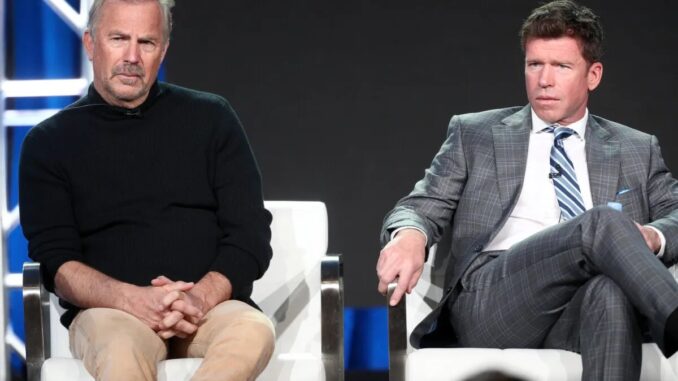
Kevin Costner made a bold choice.
He departed the most popular TV show in the country and decided to tell the sweeping story of American Western expansion in four interconnected films before anybody knew if the first one was any good.
Well, by the end of “Horizon: An American Saga – Chapter 1,” which clocks in at more than three glacial hours, I could not fathom committing another 540 minutes of my time to this bloated ego trip.
It’s hard to believe Costner left “Yellowstone” to make such an embarrassing, poorly told mess.
What the writer-director-star is trying to do with his difficult-to-follow tale that begins in 1859 and spans 15 years is humanize and deepen the frontier. Fine idea.
The natural scenery is stunning throughout. And there are familiar elements of classic Western films (though what I wouldn’t give for a transportive Ennio Morricone score over composer John Debney’s sappy sledgehammer soundtrack) and the expected big shootouts.
However, the battles are uglier and more morally fraught than usual. For instance, early in the movie when a town called Great Day is attacked by Apache Native Americans, a family — including little kids — blows themselves up to avoid painful torture.

The dark reality of manifest destiny is a worthy topic, and worthy of a much better film. One in which we have even a modicum of investment in any of the characters.
There are more than 20 named roles scattered all over the place — the San Pedro Valley, the Montana Territory, the Western Santa Fe Trail — and viewers strain to care much for any of them, so bland and animatronic they all are.
Costner cuts in and out of their boring journeys, a la “Game of Thrones,” and it’s assumed they’ll meet up in later films.
Whoopee.
A bunch of these folks — who look like the Western outpost they come from is Malibu — are headed to the town of Horizon, which promises “premium virgin lands.”
Frances Kittredge (Sienna Miller) and her daughter Diamond (Isabelle Fuhrman) survive the destruction of Great Day and are forced to rebuild their lives.

You’d think losing one’s husband and son in a massacre would be traumatic and scarring.
Nope! Pretty soon, Frances is all smiles, hitting on Lt. Trent Gephardt (Sam Worthington), and her hair would suggest she found some Pantene conditioner behind a cactus.
Jena Malone plays Ellen, a loud wife and mother who’s been in hiding since a violent incident some years earlier. She ends up being chased by cartoony “Deliverance” brothers, and a hooker named Marigold (Abbey Lee) is left to watch over her son.
Costner plays brooding Hayes, a mysterious Old West wanderer who protects Marigold and the kid. The traveling duo’s sex scene is, to say the least, unfortunate.

Two hours in, yet more people are introduced. A young British married couple, Juliette (Ella Hunt) and Hugh (Tom Payne), is part of a wagon train, led by Matthew (a lost Luke Wilson), in search of a new life. Hunt’s whiny and phony performance is the most annoying I’ve seen in a minute.
Costner also tells the Native American side of the story. Horrendously.
All the sentimental, speechy, overscored dialogue in the script by Costner and Jon Baird is lesser Starz, or top-drawer Hallmark.
Some lines are plain word salad. A character will jabber on for two minutes and you’ll have no clue what they’ve just said. Elsewhere, it’s laughable.
After the town is burned down at the beginning, an army man points out three grave markers in the distance to a survivor.
“You didn’t take that as a sign?” the soldier asks.
“Sure we did,” responds the man. “A sign to build on the other side of the river.”
That’s where they put the zinger? The aftermath of a massacre?
The film ends with a whiplash-inducing montage of disparate moments that, I think, is meant to act as a “coming attractions” of sorts for the next three movies.
A short while earlier, Colonel Houghton (Danny Huston) observes, “There is no army across this Earth that will stop those wagons comin’.”
But instead of “wagons,” my beleaguered and terrified ears heard “sequels.”
